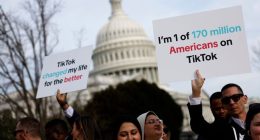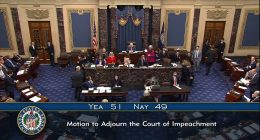
SAG-AFTRA President Fran Drescher and National Executive Director and Chief Negotiator Duncan Crabtree-Ireland on Friday laid out how the actors’ 118-day strike was ended and their thoughts on the deal with the AMPTP.
The duo, in a press conference at its Wilshire Blvd HQ, detailed the stresses and “dealbreaker” moment during the negotiations and highlighted how the reversal from the studios on AI and streaming revenue came to be.
“We are extremely proud of what we’ve advocated for and won in this new contract and I personally am extremely proud of our President and our negotiating committee and our members who have stood strong to create this change,” said Crabtree-Ireland.
RELATED: Studios “Pleased” By SAG-AFTRA Board’s Vote To Approve Strike Deal & “Grateful” For Industry Restart
However, it was clear that not all members of SAG-AFTRA’s national board were entirely happy with the deal as it passed with 86% of support, lower than expected. It’s not clear how many people voted against given that SAG-AFTRA has a “weighted” voting system.
RELATED: Actors Set To Vote On Strike Deal After SAG-AFTRA Board Approves Tentative Agreement
A summary of the contract wins is expected shortly with full details of the contract coming by Monday morning at the latest, ahead of voting, which starts on Tuesday.
Starting the presser an hour and a half late, Drescher said early on she recognized that there was a “disconnect” when it came to streaming.
“I felt there was no way that anything about this contract was going to really make a significant difference in the lives of our members who were working on the streaming platforms. The contract itself needed to change,” she said. “We decided together that we needed to go into another pocket of revenue. For 35 days, like a broken record, we said ‘We need to get into another pocket. We need to get new money from somewhere. Every single time we brought it up, the AMPTP said ‘No’.”
Crabtree-Ireland then said that such an ask “wasn’t going anywhere.”
“I think that they realized that they were facing a new kind of leadership in me and Duncan and we deflected their intimidation tactics. They had to acknowledge that we were demanding respect. So, the idea of a revenue share, we kept going back to it. OK, you don’t like the 2%, what about 1%? OK, you don’t think you can do that? It’s a bridge too far. What about the 57 cents postage stamp concept where we get that per subscriber, per year. No’,” added Drescher.
Drescher said that it was up to the studios to “meet the moment” or this “was not going to end well.”
“They worked internally to come up with some kind of a modality that worked for all the different AMPTP members, who were currently either fully entrenched in streaming or dabbling in streaming. But somehow they came together with a model that they offered to the WGA which was accepted by them. We knew that that wasn’t going to accomplish what we needed to accomplish. But, as my Buddhist wisdom teaches me, ‘The tallest of the bamboo trees are able to lean the farthest’. So, I had to wrap my mind around the fact that we needed to make this work. I’m a girl from Flushing so to me, money is money, it’s just as green, wherever it comes from, just hand it over.”
It was at that point that Crabtree-Ireland came up with the streaming bonus fund concept that would allow the union to use the studio mechanism to distribute the money to actors.
This fund is a 75/25 split so 75% of the money goes to actors on shows that meet the criteria set, which she called a “thimble worth of shows.” “They deserve to have the bonus,” she said, saying in a previous world, these shows would have gone to syndication.
“I felt like ‘Is this a win or a loss?’ but we’re getting the money. We opened a new revenue stream. It’s what we said in the beginning to them, it didn’t matter the mechanism, it didn’t matter the amount. What mattered was that we got into another pocket and we did. I had to once again be fluid and wrap my mind around that and not make the perfect, the enemy of the good,” she added.
The Nanny star added that maybe next time in three years, the criteria for bonus payments moves from 20% of viewers to 10% of viewers.
“I started to think and realize this is an ongoing, living thing, a contract, and we’re not over. We’re only just beginning to get it on the page, get that language, get into that pocket and let’s go baby,” she added.
Drescher joked that the “Fran Plan” was all about time and patience.
She admitted there were plenty of stressful moments during the process and highlighted the studios’ intimidation tactics, particularly pointing to her plushie that has been widely discussed.
“The weight of it all was extremely stressful. Many times I had to stay home on Zoom, and lead in my bathrobe, because it was just so stressful and going into the room with the AMPTP, it was a lot, so if I could be home with my dog, it was helpful,” she added.
Drescher concluded by thanking the AMPTP for “recognizing the gravity of this historic and seminal negotiation and meeting the moment.”
Deadline caught up with both after the press conference.
Also Read More: World News | Entertainment News | Celeb News
Source: DLine








